chapter3翻译方法
- 格式:ppt
- 大小:1.82 MB
- 文档页数:22
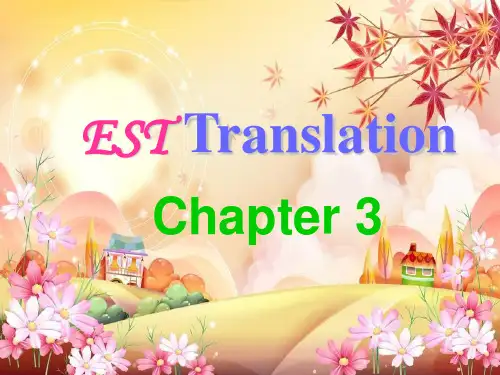
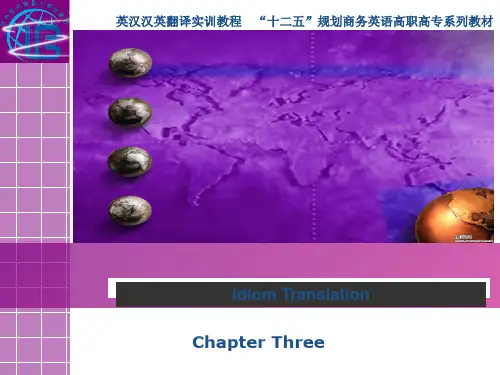
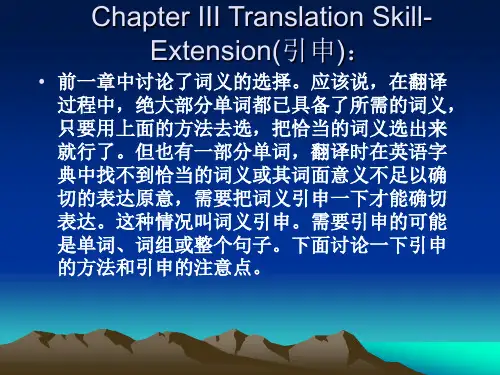
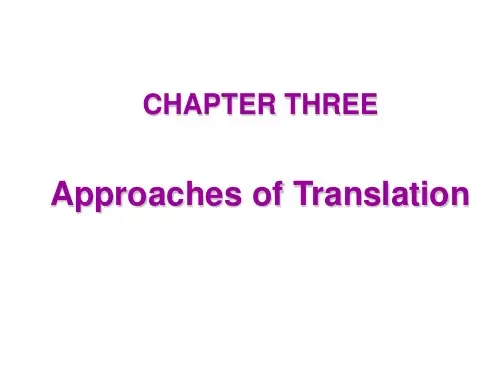
![[VIP专享]了不起的盖茨比第三章中英翻译The Great Gatsby Chapter 3](https://uimg.taocdn.com/43e3407c83c4bb4cf7ecd198.webp)
Chapter 3THERE was music from my neighbor's house through the summer nights. In his blue gardens men and girls came and went like moths among the whisperings and the champagne and the stars. At high tide in the afternoon I watched his guests diving from the tower of his raft, or taking the sun on the hot sand of his beach while his two motor−boats slit the waters of the Sound, drawing aquaplanes over cataracts of foam. On week−ends his Rolls−Royce became an omnibus, bearing parties to and from the city between nine in the morning and long past midnight, while his station wagon scampered like a brisk yellow bug to meet all trains. And on Mondays eight servants, including an extra gardener, toiled all day with mops and scrubbing−brushes and hammers and garden−shears,repairing the ravages of the night before.Every Friday five crates of oranges and lemons arrived from a fruitier in New York every Monday these same oranges and lemons left his back door in a pyramid of pulp less halves. There was a machine in the kitchen which could extract the juice of two hundred oranges in half an hour if a little button was pressed two hundred times by a butler's thumb.At least once a fortnight a corps of caterers came down with several hundred feet of canvas and enough colored lights to make a Christmas tree of Gatsby's enormous garden. On buffet tables, garnished with glistening hors−d'oeuvre,spiced baked hams crowded against salads of harlequin designs and pastry pigs and turkeys bewitched to a dark gold. In the main hall a bar with a real brass rail was set up, and stocked with gins and liquors and with cordials so long forgotten that most of his female guests were too young to know one from another.总是有悠扬的音乐在夏夜的晚上从我隔壁传出。
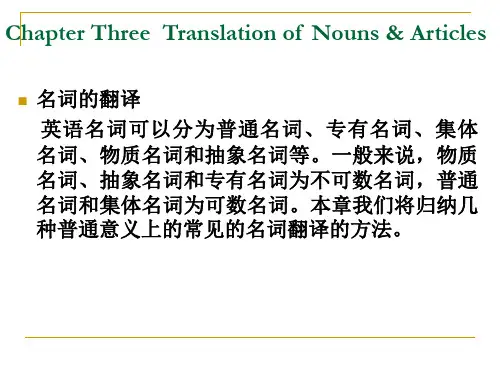
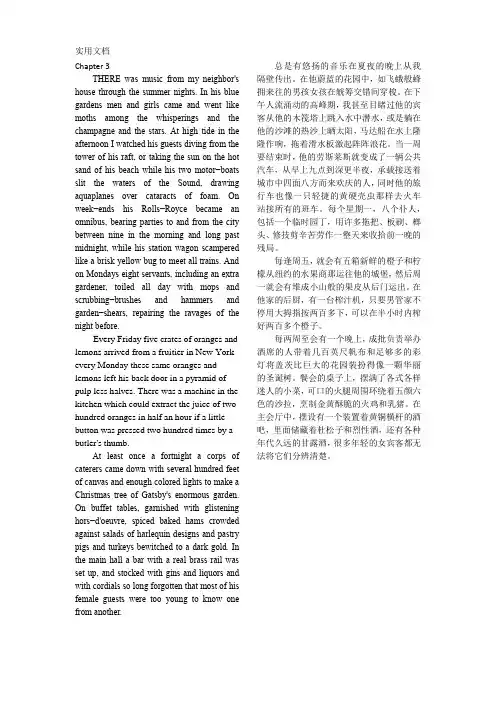
Chapter 3THERE was music from my neighbor's house through the summer nights. In his blue gardens men and girls came and went like moths among the whisperings and the champagne and the stars. At high tide in the afternoon I watched his guests diving from the tower of his raft, or taking the sun on the hot sand of his beach while his two motor−boats slit the waters of the Sound, drawing aquaplanes over cataracts of foam. On week−ends his Rolls−Royce became an omnibus, bearing parties to and from the city between nine in the morning and long past midnight, while his station wagon scampered like a brisk yellow bug to meet all trains. And on Mondays eight servants, including an extra gardener, toiled all day with mops and scrubbing−brushes and hammers and garden−shears, repairing the ravages of the night before.Every Friday five crates of oranges and lemons arrived from a fruitier in New York every Monday these same oranges and lemons left his back door in a pyramid of pulp less halves. There was a machine in the kitchen which could extract the juice of two hundred oranges in half an hour if a little button was pressed two hundred times by a butler's thumb.At least once a fortnight a corps of caterers came down with several hundred feet of canvas and enough colored lights to make a Christmas tree of Gatsby's enormous garden. On buffet tables, garnished with glistening hors−d'oeuvre, spiced baked hams crowded against salads of harlequin designs and pastry pigs and turkeys bewitched to a dark gold. In the main hall a bar with a real brass rail was set up, and stocked with gins and liquors and with cordials so long forgotten that most of his female guests were too young to know one from another.总是有悠扬的音乐在夏夜的晚上从我隔壁传出。
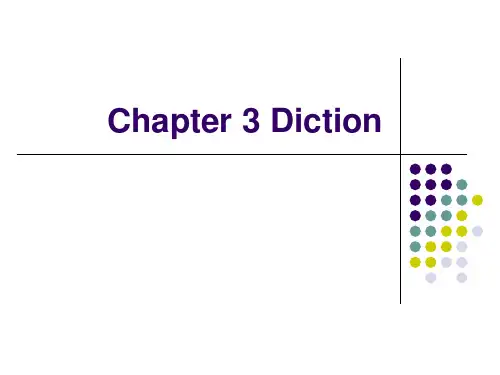
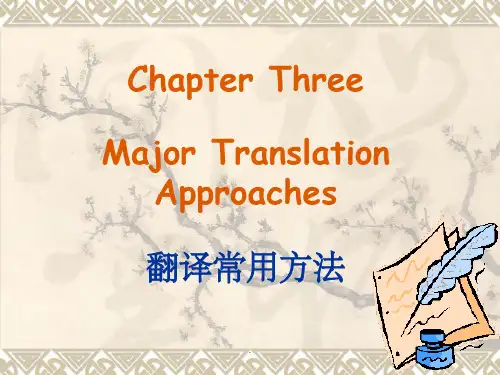
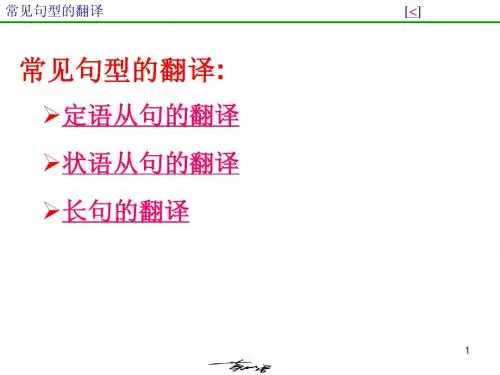
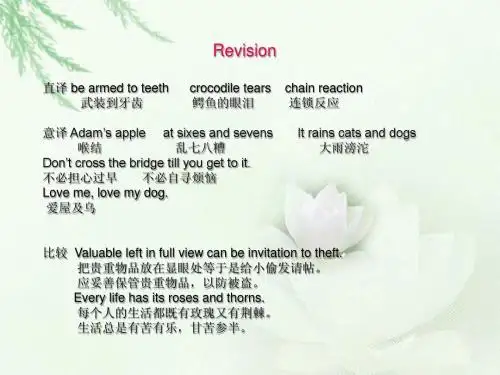
Little Prince[ Chapter 3 ]- the narrator learns more about from where the little prince cameIt took me a long time to learn where he came from. The little prince, who asked me so many questions, never seemed to hear the ones I asked him. It was from words dropped by chance that, little by little, everything was revealed to me.The first time he saw my airplane, for instance (I shall not draw my airplane;that would be much too complicated for me), he asked me: "What is that object?""That is not an object. It flies. It is an airplane. It is my airplane." And I wasproud to have him learn that I could fly.He cried out, then: "What! You dropped down from the sky?""Yes," I answered, modestly."Oh! That is funny!"And the little prince broke into a lovely peal of laughter, which irritated mevery much. I like my misfortunes to be taken seriously.Then he added: "So you, too, come from the sky! Which is your planet?"At that moment I caught a gleam of light in the impenetrable mystery of his presence; and I demanded, abruptly: "Do you come from another planet?"But he did not reply. He tossed his head gently, without taking his eyes frommy plane: "It is true that on that y ou can‘t have come from very far away..."小王子【第三章】-叙述者知道了更多关于小王子是从哪里来的的事搞清楚他从哪里来用了我很长时间。
Chapter 3 翻译的过程翻译的过程是正确理解原文和创造性地用另一种语言再现原文的过程,大体上可分为理解、表达和校核三个阶段。
在翻译实践中,理解是表达的前提,但理解与表达通常是互相联系、往返反复的统一过程,不能截然分开。
在理解的时候,译者已自觉或不自觉地在挑选表达手段;在表达的时候,又进一步加深了理解。
在处理句子、段落或文章时,译者往往要从英语到汉语,从汉语到英语,反复推敲,仔细研究。
1 理解阶段——基础和关键理解(comprehension)可分为广义理解和狭义理解。
广义理解指对原文作者的个人、原文产生的时代背景、作品的内容以及原文读者对该作品的反映。
狭义的理解仅指对原作文本的理解。
对原文透彻的理解是确切翻译的第一步,也是翻译全过程最重要的一步。
正确的理解有助于正确的表达,而正确的理解取决于译者能否对原文进行深入细致的语法分析grammatical analysis、语义分析semantic analysis、语体分析stylistic analysis和语篇分析text analysis。
1.1语法分析——从语法的角度去剖析原文里句子的语法结构,弄清句子所传递的意义。
1.She recalled faintly an ecstasy of pain, the heavy odor of chloroform, a stupor which had deadened sensation, and an awakening to find a little new life to which she had given being, added to the great unnumbered multitude of souls that come and go.(重复译法)她模糊地回想起当时极度的痛苦,想起了浓烈的三氯甲烷麻醉剂的气味;她记得自己失去了知觉,昏了过去,而醒来时发现自己又为来来往往的芸芸众生增添了一条小小的新生命。
英汉翻译技巧第一部分英译汉CHAPTER ONE THE GENERAL INTRODUCTION OF TRANSLATIONTHE V ARIOUS DEFINITIONS OF TRANSLATION1)ALEXANDER FRASER TYTLER (1747-1814)I WOULD THEREFORE DESCRIBE A GOOD TRANSLATION TO BE: THAT, IN WHICH THE MERIT OF THE ORIGINAL WORK IS SO COMPLETELY TRANSFUSED INTO ANOTHER LANGUAGE, AS TO BE DISTINCTLY APPREHENDED, AND AS STRONGLY FELT, BY A NATIVE OF THE COUNTRY TO WHICH THAT LANGUAGE BELONGS, AS IT IS BY THOSE WHO SPEAK THE LANGUAGE OF THE ORIGINAL WORK.好的翻译应该是把原作的长处如此完备地移注入另一种语言,以使译入语所属国家的本地人能明白地领悟、强烈地感受,如同使用原作语言的人所领悟、所感受的一样。
THE THREE GENERAL RULES FOR TRANSLATION:FIRST GENERAL RULE: A TRANSLATION SHOULD GIVE A COMPLETE TRANSCRIPT OF THE IDEAS OF THE ORIGINAL WORK.译文完全复写出原作的思想。
SECOND GENERAL RULE: THE STYLE AND MANNER OF WRITING IN A TRANSLATION SHOULD BE OF THE SAME CHARACTER WITH THAT OF THE ORIGINAL.译文的风格与笔调应与原作具有相同的特性。
chapter 翻译基本解释●chapter:章节,篇章●/ˈtʃæptər/●n. 章节,篇章变化形式●复数形式:chapters具体用法●n.:o意思:章节,篇章o同义词:section, part, division, segment, portiono反义词:whole, entirety, total, aggregate, sumo例句:●The first chapter of the book introduces the main charactersand sets the scene for the story. (这本书的第一章介绍了主要人物并为故事设定了场景。
)●Each chapter in the textbook covers a different aspect of thesubject matter, providing a comprehensive understanding.(教科书中的每一章都涵盖了主题的不同方面,提供了全面的理解。
)●The final chapter of the novel brings all the plot threadstogether in a satisfying conclusion. (小说的最后一章将所有情节线索汇聚在一起,形成一个令人满意的结局。
)●In the history of the company, this year marks a new chapterwith the launch of innovative products. (在公司的历史中,今年标志着一个新篇章,推出了创新产品。
)●The chapter on climate change in the report highlights theurgent need for global action. (报告中关于气候变化的章节强调了全球行动的紧迫性。